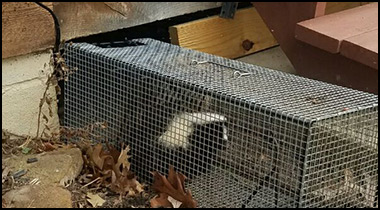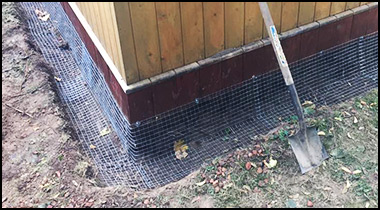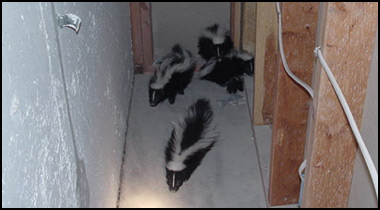Green Bay Skunk Removal Resources
Skunk Rehabber - Bay Beach Wildlife Sanctuary: (920) 391-3671
Free Brown County Animal Services: 920-448-3200
Humane Wildlife Trappers of Green Bay: 920-351-4229
If you need skunk control in Green Bay, you have a few options. First, you can attempt to solve the skunk problem yourself by reading our do-it-yourself guide. If you need outside help, you can also call Brown County Animal Services to see if they have any free resources or help for you - however, they primarily deal with dog and cat concerns. You can also call a local Green Bay wildlife rehabber, as they are typically a great resource for advice that is in the best welfare of the animal. If as a last resort you must hire a professional company, we recommend Humane Wildlife Trappers of Green Bay at 920-351-4229. To learn more about them or check their skunk removal prices, visit greenbaypestanimal.com.

Green Bay Skunk Trapping and Removal

Preventative Repairs & Exclusion

Green Bay Skunk Removal From Structures
In many cases, preventative measures can solve your Green Bay skunk problem - keep garbage secured, pet food indoors, and most of all when it comes to skunks, secure the perimeter of your shed, porch, deck, or house with a barrier - lattice or steel mesh is good, and it keeps Wisconsin skunks from going under the structure. If trapping and removal of the skunk is the only option you have, please do so with the help of a local agency or professional company who knows how to do it humanely and legally. Browse the resources of this site for more educational information.
Frequently Asked Questions:
Prevention: How to Keep Skunks Away
What to do with a skunk after I catch it?
Is it legal for me to trap a skunk?
How to remove skunk odor
Is a skunk active during the daytime rabid?
What does skunk feces look like?
Green Bay Skunk Control Information: Do Skunks Kill Chickens?
Skunks will most often enter the chicken coop for eggs and baby chicks. They also will on occasion attack an adult chicken. Skunks have very bad eyesight and with that in mind are likely to grab the first bit of food they can find and run. This is often a chicken egg. There are the occasions in which a skunk will attack an adult chicken. Because a skunk does not have a stomach large enough to contain an entire chicken, they will go for the head of the chicken and ingest the blood. This may be one way of identifying what has attacked your chicken coop. Known for being loners, skunks have been known to team up to attack the chicken coop and kill more than one adult chicken.
There are indeed ways to keep skunks out of your chicken coop without the use of a lethal pesticide. Fencing is one method. The fence should be at least 3 feet in height. Beneath the dirt however the fence should be no less than 11/2 feet to 2 feet deep. Prior to burying your fence bend the edges at least 6 inches facing away from the coop.
Discouraging a skunk to stay away from your property including the chicken coop requires a good deal of preventative measures. As in the fence the preventative measure used here is the bending your underground portion of your fence. This way there will be no digging under.
In many cases the thought is that the skunk is merely a nuisance in your coop, they can go far beyond that. Should you economically rely on the chicken eggs or the adult chicken a skunk along with other predators can rapidly destroy your plans for selling or eating your chickens and eggs.
Most stories one hears about the skunk does not usually involve the killing of the adult chickens, this almost appears to be more of a sport than that of survival.
Skunks are not an endangered species; they can and will be found anywhere. Though they are particular to environments where food can be easily obtained despite what the human population may be.
The human population does indeed encourage the number of skunks to be seen. Cleaning your property of debris and garbage will aid in the appearance of skunks. In high population areas, the less food provided by man the better.
Remember, for free services you can try (920) 391-3671 or 920-448-3200, but if you need to pay for professional help, check the prices at the greenbaypestanimal.com website. Or follow our do-it-yourself guide!

